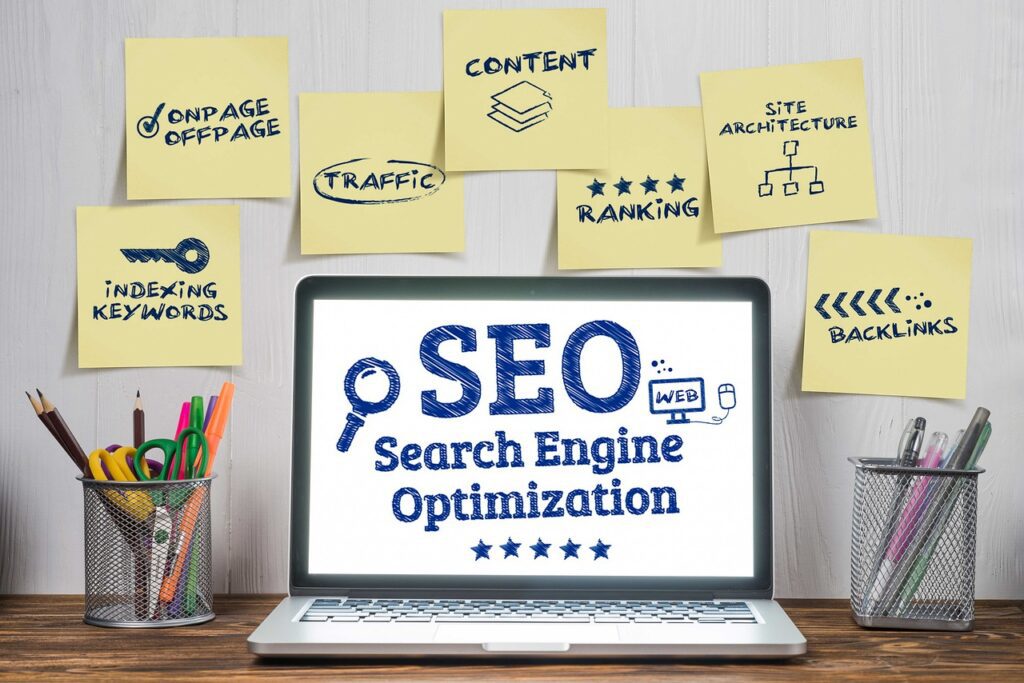From the outset, theSEO evolution has constantly shaped the field of SEO, revealing surprises at every turn. The history of SEO is marked by continuous adaptation in the face of algorithmic updates, technological innovations, and evolving user behaviors. In this ever-changing world, flexibility and continuous learning are crucial to successful navigation. This guide explores the SEO odyssey, offering insights for understanding the past, mastering the present, and preparing for the future.
The past of SEO
In the past, early SEO techniques were relatively simplistic and often dominated by keyword stuffing and the use of low-quality backlinks. The less sophisticated search engines of the time were easily manipulated, resulting in unreliable rankings and a poor user experience.
However, as search algorithms such as Google's PageRank emerged, they gradually raised standards by favoring valuable content and relevance over exploitable techniques. This marked a turning point, positioning SEO as a discipline based on understanding user behavior and developing intelligent, user-centric content strategies.
This shift to a more quality- and relevance-focused approach has not only improved the credibility of search engine results, but has also encouraged content creators to concentrate on satisfying user needs, reinforcing the importance of user experience in the online SEO landscape.
The evolution of SEO
Originally, SEO was all about keyword density and inbound links. But those days are gone. The major milestones in the evolution of SEO have been the industry's response to Google's frequent algorithm updates. Google is constantly seeking to improve the relevance and quality of search results for users, and this has shaped the SEO landscape.
For example, with the introduction of Google Panda or Penguin, today's SEO strategies must transcend simple optimization. They must embrace a much broader perspective that includes user experience (UX) and content quality. Taking these aspects into account is now essential to stand out in an ever-changing digital environment.
Predicting the future...
Like any self-respecting discipline, SEO is not immune to the transformational impact of artificial intelligence (AI). AI is set to redefine SEO, demanding new skills from professionals. For example, Google's RankBrain algorithm and the roll-out of mobile-first indexing illustrate how advanced technologies will require strategic adjustments in SEO.
UX is becoming increasingly central to search engine ranking criteria. A site needs to be more responsive, faster loading and easier to use if it is to rise to the top of the SERPs (search engine results pages).
Also, the advent of voice and visual search promises to revolutionize the way we optimize content. Voice assistants such as Alexa, Siri and Google Assistant are gaining in popularity, bringing with them the necessary adaptation of keywords and content.
Local SEO will also see sustained growth, particularly for companies with a physical presence. The Google My Business tool and local search results are becoming strategic weapons for reaching a local audience and differentiating yourself in your region.
... with a few nuances
Of course, this outlook for the future raises legitimate concerns about the increasing complexity of SEO. However, it's important to emphasize that tools such as Google Search Console democratize access to data and make SEO management accessible and pragmatic. What's more, despite the rise of automation via AI, human expertise retains an irreplaceable place in interpreting data and devising strategies.
As for the argument that local SEO is a niche phenomenon, current trends and statistics clearly demonstrate the growing influence of local searches for consumers and their significant impact for businesses. Recognizing the growing importance of local SEO and adapting SEO strategies accordingly is essential to staying competitive in the marketplace.
Examples of the evolution of SEO
To support our predictions, let's take the example of Google RankBrain, which perfectly illustrates the integration of artificial intelligence into search algorithms. It demonstrates how AI has revolutionized the way search engines work, by analyzing and learning from user queries to deliver more relevant results.
Similarly, mobile-first indexing highlights the growing importance of user experience in SEO. This approach underscores the imperative for websites to optimize their mobile versions in order to meet user expectations and position themselves favorably in search results.
In addition, the widespread adoption of voice assistants and the development of visual search technologies such as Google Lens mark the beginning of a new era in online content optimization. These advances offer companies new opportunities to enhance user engagement and strengthen their online presence in a more interactive way.
Finally, local SEO is becoming increasingly important thanks to tools like Google My Business, which enable companies to target a specific local audience and boost their visibility in a globalized market. This strategy is becoming indispensable for companies seeking to stand out locally and attract relevant customers to their region.
Towards a Bright Future: SEO Evolution and Permanent Adaptation
Mastering the evolution of SEO requires a posture of continuous learning and an ability to adapt nimbly in the face of change. As a dynamic industry, SEO is constantly developing, inviting us to remain innovative and optimistic. By embracing technological advances and exploiting the opportunities they offer, we can look forward to an upward trajectory for SEO. Let's think big for the future of SEO, recognizing that our professional growth is intimately linked to our ability to evolve with it.










